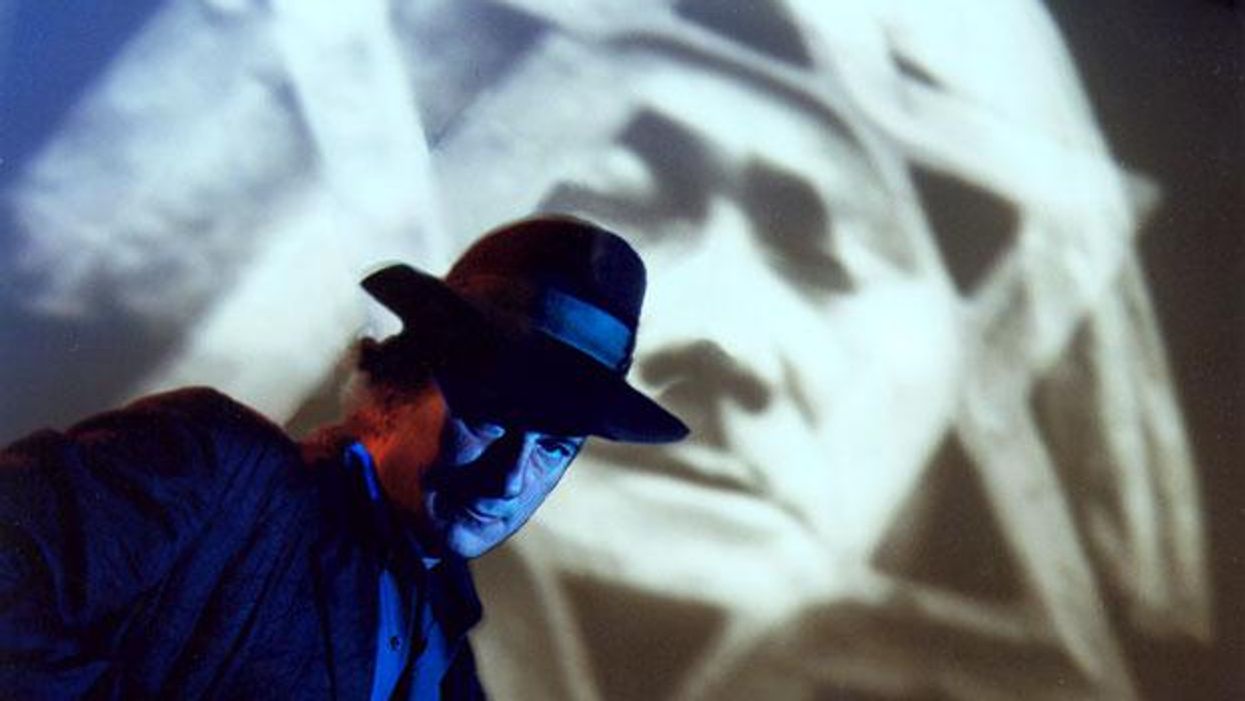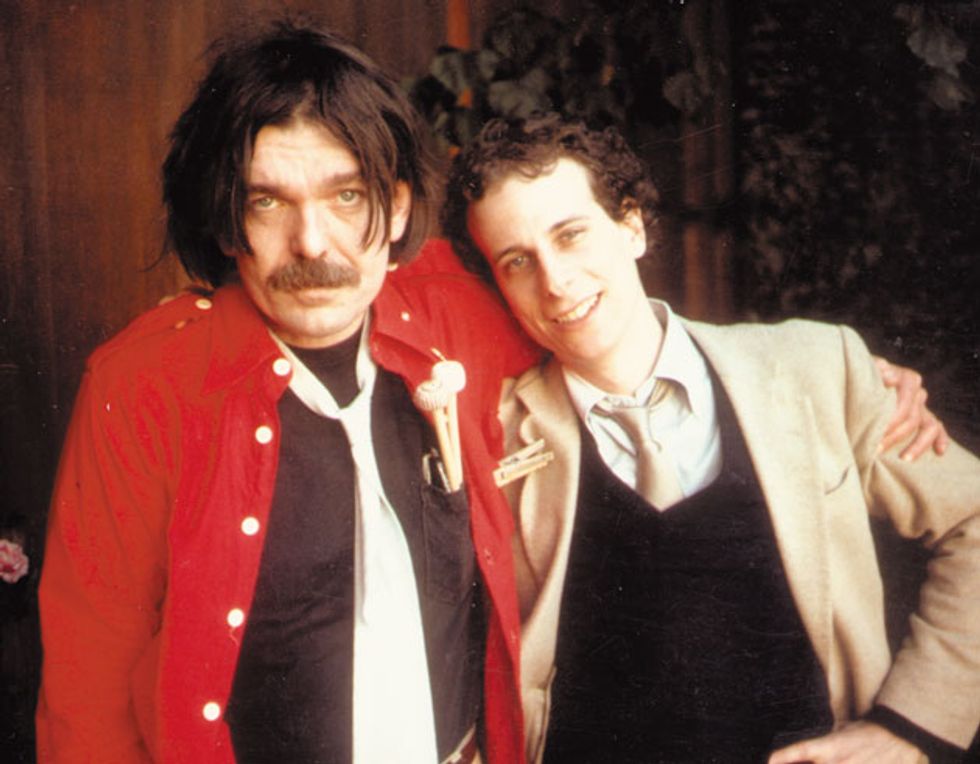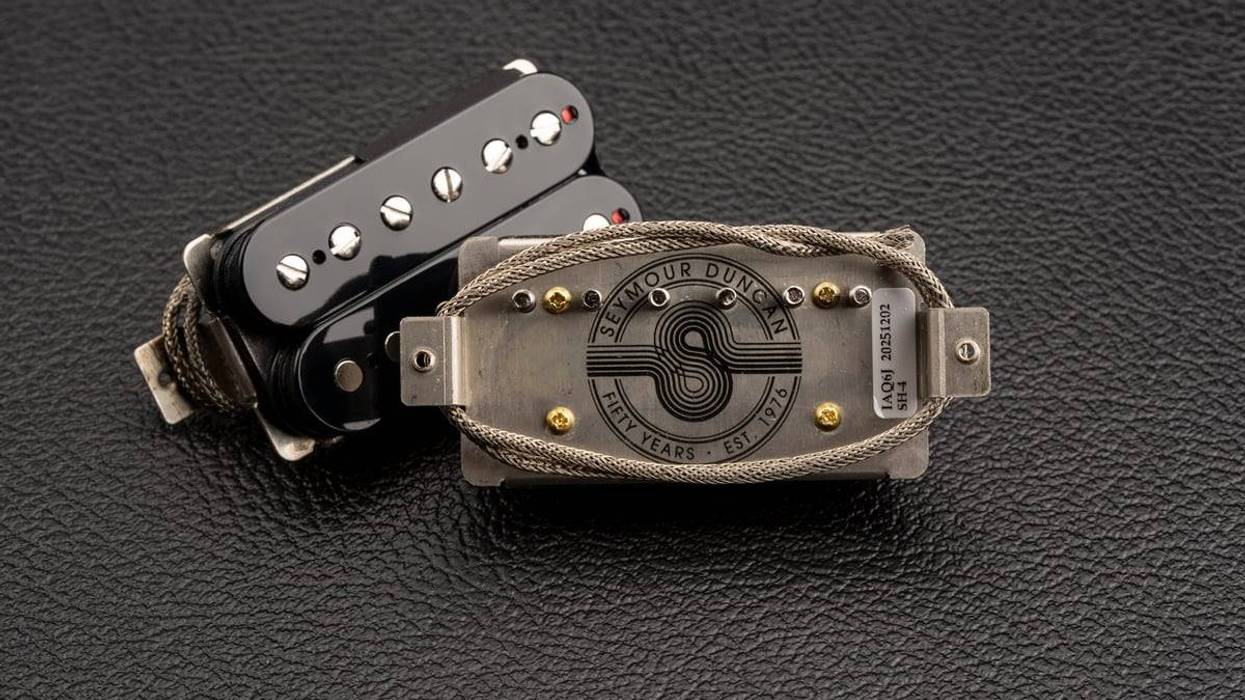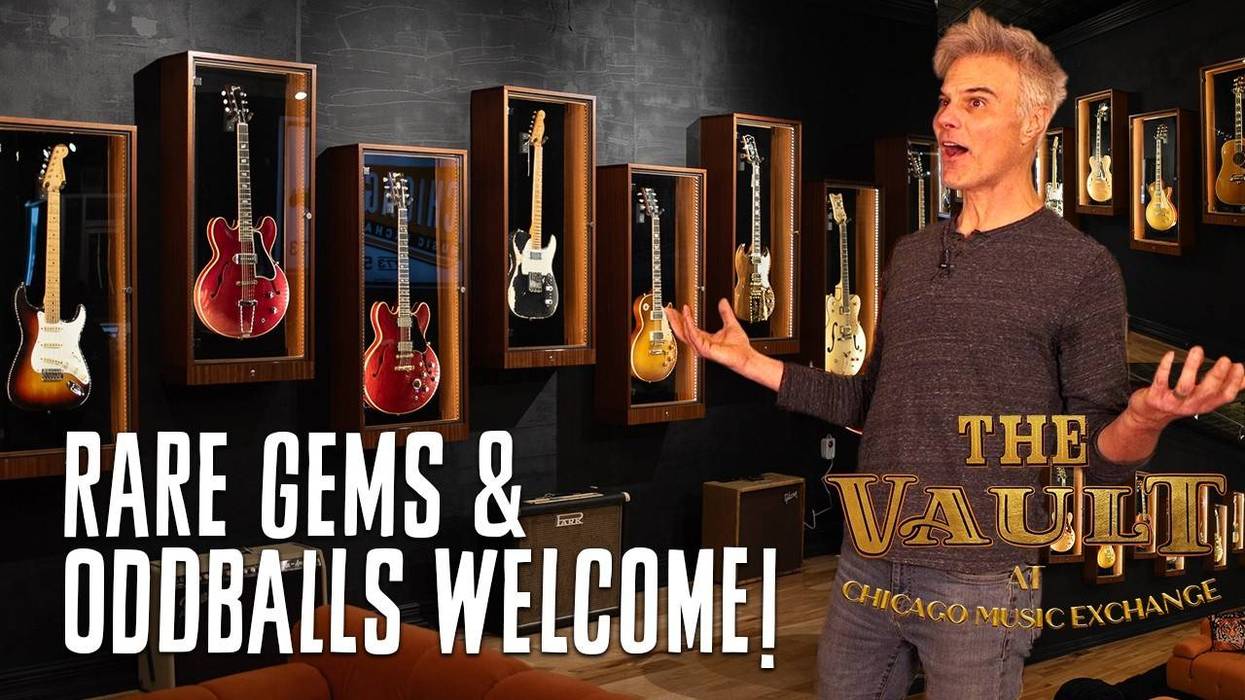“A lot of my work is trying to throw light on the dark corners of culture that have been unfairly neglected," says Gary Lucas. “I'm on a mission. I'm a champion for the underdog."
Lucas, despite his mastery of the guitar, is an underdog himself. The Manhattan denizen is a 6-string composer, improviser, and conceptualist of the highest order who, despite his excellence and impressive resume, has never quite ignited the creative powder keg to blast him into the mainstream.
He's come close. In the early-through-mid-'80s, Lucas played lead guitar for Captain Beefheart (née Don Van Vliet) during the avant rocker's brief MTV period. Lucas' fire-setting on Beefheart's 1982 Ice Cream for Crow—especially his performance of the ferociously complex, fingerpicked solo recitation “Flavor Bud Living"—made him a darling of the guitar press. At the time, Lucas held down a day gig as a copywriter at CBS Records. (Blame him for the ad line, “Can you take 12 inches of Judas Priest?") In 1988, he staged his first solo performance at the original Knitting Factory—a sold-out affair which resulted in an invitation to play his first European solo gigs and encouraged him to strike out on his own.
Lucas' closest scrapes with stardom were in the early '90s. At the decade's start, he signed a deal with Columbia Records. Like many other major label contracts, it evaporated before an album was made, when the A&R department reconfigured. But at the same time he began a collaboration with Jeff Buckley. “I had a vision for a Led Zeppelin type of band, with me and Jeff playing the roles of swaggering guitar player and shamanistic singer," says Lucas.
After co-writing, recording, and a handful of now-legendary shows, Buckley ultimately decided to pursue a solo career, but not before he and Lucas penned “Grace" and “Mojo Pin," the songs that became the foundation of the legacy of the ill-fated Buckley, who drowned along the Mississippi River's Memphis shore in 1997. Lucas' book about their team-up, Touched by Grace: My Time with Jeff Buckley, was published in 2013.
Since that first Knitting Factory gig, Lucas' output has been prolific. He's made nearly 30 albums, mostly as a solo artist and as leader of his band Gods & Monsters. He's toured in roughly 45 countries—primarily as a solo performer whose deft playing and knowledge of effects, especially delay, gives him an orchestral palette.
Lucas has often put that skill and his pedalboard to service performing live soundtracks to films that include the Jewish monster fable The Golem, the 1931 Spanish language version of Dracula, the 1967 Brazilian cult-horror classic This Night I Will Possess Your Corpse, the historic Lon Chaney film The Unholy Three (1930), and other works that reflect his interest in “the dark corners of culture." These performances flow easily between composed and improvised sections, and laid the groundwork for his 2013 album Cinefantastique, which tackles themes from The Man Who Shot Liberty Valance; Dracula; Aguirre, the Wrath of God; Monsieur Hulot's Holiday; and other classic films. It's essentially the kind of revisionist material that's been earning Grammy nominations for his fellow guitar genius, Bill Frisell.
Another cineaste's treat, the cartoons of Max Fleischer, has triggered one of Lucas' new albums and collaborations. Fleischer was the Kraków-born New Yorker whose featurettes starred a range of characters from Betty Boop, Koko the Clown, Superman, and Popeye to musicians Cab Calloway, Louis Armstrong, and Don Redman. The latter were captured via the visionary's patented Rotoscope process, which animated movement by tracing frames of live action film. Lucas teamed with actress and vocalist Sarah Stiles to perform his interpretations of the music from Fleischer's works, captured on this year's “Fleischerei."
But wait, there's more! So far in 2016 he's also released Pearly Clouds, with his new band by the same name that features vocalist Eniko Szabo and saxist Toni Dezso. Lucas met the Hungarian musicians while touring Europe. Their collective sound is an uncanny mix of traditional folksong, American roots and textural music, and jazz. And his latest album, Stereopticon, pairs him with singer Jann Klose. Although their debut is a series of guitar and vocal duets, their partnership could easily evolve into the scenario Lucas once envisioned for himself and Buckley. In fact, the angelically voiced Klose sang for actor Ben Rosenthal, who played Tim Buckley, in the 2012 film Greetings from Tim Buckley, and he and Lucas met at a Buckley tribute concert.
The guitarist lays into his battered 1946 Gibson J-45 on all three of his new releases.
“These albums really let me fly in different directions," Lucas says. “I love the music in the Fleischer cartoons, which I used to project when I was in the film society at Yale. How Max and his brother, Dave, drew on Yiddish theater is icing on the cake for me. With Pearly Clouds, we achieved some honestly beautiful music with me free-forming my guitar arrangements in the studio, which really filled out the sound. And working with Jann—I had all the songs composed in advance except for one that was spontaneously conceived on a blues change, and in some ways it reflects back to the early days working with Jeff, which were so full of excitement and promise."
Although Lucas was a Strat player when he helped Beefheart briefly break out of the cage of the avant-garde, in recent years he's favored his J-45 for all kinds of performances, including his effects-laden sojourns through the cinematic past. Nonetheless, his '64 Strat is far from mothballed, and neither is the 1928 National Duolian he bought under instruction from Beefheart when he was in the Magic Band. “I acquired it to play on 'Skeleton Makes Good' on Ice Cream for Crow," Lucas recalls. “Don loved it and said, 'It's not a guitar. It's an instrument of destruction.'"
We caught Lucas on the phone in his New York apartment shortly after a tour of Australia with Gods & Monsters, where they performed a series of Buckley tribute concerts. He gave us a glimpse at the motives and modus operandi of one of the world's foremost avant guitarists and unsung monsters of modern music.
What drew you to unconventional music?
I had an inquisitive mind as a boy and I've tried to preserve that sense of wonder all my life. My interests as a boy were not musical. I was an avid reader. I loved Greek mythology and, to a certain degree, Marvel and DC comic books. And that channeled into the horror genre through Famous Monsters of Filmland. That and Famous Monsters of Filmland. probably warped my sensibility. It's not a tremendous leap from monster magazines to strange music.
My tastes were circumscribed by what I could get on the radio growing up. The first thing that attracted me was the Thurston Harris song, “Little Bitty Pretty One." It was so bluesy and soulful. I remember hearing that in my mother's car. I was attracted to checking out the bins in records stores for budget classical records that had electronic and avant-garde music. I found some amazing stuff in there, like early Stockhausen. I found world music. Nonesuch had the Explorer Series. I found Delta blues. That all gave me a good grounding for the avant-garde. I loved that it crossed genres.
Beefheart, of course, was the turning point. When I heard him, I thought, “This is the greatest music I've ever heard." And seeing the band execute it confirmed that. To me it was like, “I gotta join this band if I do anything in music." It's like running away to join the circus. 7 Faces of Dr. Lao is one of my favorite films. I'm like the little boy in that film—trying to stumble on the circus of wonders. This is what's driving me.
There are numerous tales of Don Van Vliet torturing his bands. Had he mellowed by the time you played with him?
To a degree. We had the advantage of not living with him in a house. I daresay no one in the group of musicians I played with, with him, has any bitter memories. Did he mellow? Well, he would show flashes of temper. He could be really irascible.
I loved Don. He was my mentor, for sure, and a father figure to me. I learned a hell of a lot about the world. Here you have a guy whose message was a message of love in his talk, poetry, art, and music. I find what other people might consider rabid noise to be quite beautiful at times. Like Schoenberg. I was really attracted to Don's psychic state as portrayed in his music. Don would say, “I'm just trying to turn myself inside out." It's a question of how open a mind you have. I have to throw psychedelic drugs in there, too. It certainly opened me up to a lot of experiences.
There's not a genre of music that I can't find something beautiful about. That includes scorned genres like polka. To categorically condemn a genre is ridiculous, even if it's not your cup of meat. You have to admit that there are some really excellent practitioners in every genre. But I pay hardly any attention at all to what's currently considered mainstream music. My ear closes down. I hear enough just getting coffee in the morning in the deli.
Lucas on Beefheart: “He was my mentor, for sure, and a father figure to me. Here you have a guy whose message was a message of love in his talk, poetry, art, and music." Photo by Glenn Kolotkin
How does your music reflect who you are?
I don't make arch music. I'm sincere about everything I do. I've never done comedy music. I've done sarcastic music. But straight from the heart is the only way I know how to play. I don't want to filter it. I hope it would do good in the world and touch people. A lot of it has—particularly the Buckley era.
What about formal training?
I did take guitar lessons for a month when I was 9, but the strings were too high off the fretboard on the the practice guitar my father rented me, so I was getting really bloody fingers practicing on it. I quit. Then they came back from a trip to Mexico with a nylon-string guitar, and I took it up again because it was fun to play. And within a week of guitar lessons, I also took up French horn. That was on the suggestion of the school band leader, because I'd scored a perfect score on a music aptitude test. It was ridiculous because I barely have an upper lip. But I loved it. I toughed it out manfully for 7 or 8 years until I got tossed out of the band for improvising on a march. Also, I was wearing sandals in the band room.
So I can read music and have occasionally been known to write it out. How does it apply to my situation as a musician? I don't think it goes into the mix at all. I don't score songs on paper. I teach people parts and then let them come up with their own parts. I'm a very democratic bandleader. That's how I tend to get the best results for what I'm doing. Beefheart had a great quote: “Music is just black ants crawling across white paper." And he was one of the greatest composers of all time.
Some years ago, your axis seems to have tilted more toward acoustic guitar.
It could switch back at any time. Right now I'm ramping up to record The World of Captain Beefheart with Nona Hendryx and a couple of the guys from Fast 'n' Bulbous, my Beefheart tribute band. That's all gonna be on electric, of course. I go back and forth. I got sick of schlepping a couple of guitars plus the effects. When I made 2014's Other World with [Brit-prog legend] Peter Hammill, that's some of my freakiest psychedelic interstellar explorations on my Strat.
I've had my J-45 since 1989 and played it on my first album. It's super beat-up, with a few cracks. To me guitars are just planks of wood. Well, they have a soul, but these old Gibson acoustics are resilient in terms of tone.
Gary Lucas' Gear
Guitars
• 1964 Fender Stratocaster
• 1966 Gibson Firebird
• 1946 Gibson J-45
• 1928 National Duolian
Amps
• Fender Deluxe
• Fender Hot Rod DeVille
Effects
• DOD A/B box
• TC Electronic Spark Booster
• TC Electronic PolyTune 2 Blacklight tuner
• Boss MZ-2 Digital Metalizer
• Boss volume pedal
• Boss PS-2 Digital Pitch Shifters (2)
• Boss TR-2 Tremolo
• TC Electronic Hall of Fame Reverb
• Electro-Harmonix 16 Second Digital Delays (2)
• MXR M102 Dyna Comps (2)
Strings and Picks
• Ernie Ball 2221 Regular Slinky (.010–.046)
• Dunlop Jazz III picks
• Glass bottleneck
Do you miss the ease of bending and other Strat-like moves on the acoustic?
No, because I have it strung with light-gauge electric guitar strings, so I can do all of that. I don't like the super bright string sound after you put them on; I only like the way they sound after a week or two. But then, as the strings age, they constantly need adjustment so there's constant tuning at my shows. I've just learned to live with it. It's helped me with my patter.
You're a hybrid picker, yes?
It depends. On some of the Beefheart, I can articulate better with the Dunlop pick, but I usually end up using some fingers. I built up the calluses a long time ago, to be able to achieve everything picking with my fingers. I find fingerpicks incredibly cumbersome.
At the start I was doing straight-on flatpicking—Jeff Beck-ish. At Yale I ran into two guitarists in my first week who were so generous to me, and they had metal fingerpicks. One of them showed me the rudiments of that. From there I took off with it, but I didn't get serious until I was in Taiwan after college and living in the hills outside Taipei. I used to come back from my day job—import-export—and sit by the fire, and I'd get out my nylon-string guitar and really got into country-blues picking. That, and a couple years later getting into Beefheart's band, is where I took a leap into fingerpicking. He sent me “Flavor Bud Living" and I thought, “How the fuck am I going to play that?" I had to adapt my fingerpicking technique. What made it hard is he wanted me to use the heaviest strings known to man—a .013 on the bottom and a .056 on top. It was a stretch to the limits of my technique, and then I had to go find some more technique.
Do you have any go-to tunings?
“Flavor Bud Living" is in standard tuning; “Evening Bell" [also from Ice Cream for Crow] is dropped D. Don sent me a demo on the piano, and the tonal center seemed to be a low D, so to get that effect I had to go to dropped D. It's been a lucky tuning for me. For “Grace" and “Mojo Pin," it had a magical quality. I've invented a couple of tunings that I used on my Chinese pop albums for the heck of it. I have a C modal tuning (C–G–C–G–C–E) that I love. “Dream Has Fallen" is a real good example of that. I love DADGAD.
You're a really comfortable solo performer. What did it take to get to there?
Essentially the repertoire I developed around Beefheart before I got into his band was solo. It fit my mindset. And one summer I did solo gigs at a happy hour on Nantucket. It was a really good gig. I walked into this club and offered my services, and I plugged my electric guitar into the PA and would play solo fantasias. Some of them were pieces, like Jorma Kaukonen's “Embryonic Journey," and then they would take off. I'm a bit of a loner, too, although I like people and have done plenty of ensemble stuff. I don't like the responsibility of trying to run a band. There are little rewards and people wind up resenting you no matter what you do. At last count, I have 400 or 500 compositions I could do solo. That's a lot!
You're highly prolific. What's your balance between artistic creativity and career necessity?
The older I get, the more I want to do as much as I can in the time I have left. Insofar as I have yet to find the one project that's going to give me the luxury of traction … I experienced better results with the old music business model, so I've found it challenging. It's caused me to get out and get as much work as possible, because you can't count on any one area of it. People have short memories, so if you're not in their faces as much as possible, it's like “What happened to that guy? He fell off the map!"
But you're very well respected. How would you define traction?
A 30-city tour. How's that for a golden number? And I don't know how to put it together myself to make it pay like I'd like it to pay. I used to do 25-date tours. The European market used to allow me to go over and play, say, 25 shows in Germany alone, but it's really dwindled. Now they've slapped more artist taxes on in Europe. I'd like to play a tour over there, come back to New York and pay my bills, and go back and do it again. Today, it's hard to monetize music. But I go on. I don't have a plan B—and I'm also really good at it, so I'm not gonna play any old gigs.
What's your analysis of Jeff Buckley's playing style, and how did you mesh as players?
He was an extremely accomplished guitar player. He attended the Guitar Institute in L.A. He was a big fan of Rush. People don't know that. He was one of the most musical people I've ever met. I think he had a great touch. He was also very much into open tunings and somewhat into fingerpicking, and I think I influenced him a lot on this. Right off the bat I went to hand him my own Strat at our first meeting and he declined and said he just wanted to sing. I'm not a competitive guitar player, so I just took it as a compliment. When he first met me he said, “Wow, I love your guitar playing and I've read about you in Guitar Player. I loved you with Captain Beefheart."
He could play my parts, but I think I could play them better. I don't get much mention as the co-writer of “Grace." The first version was August 1991 on a demo by Gods & Monsters. It was originally my instrumental called “Rise Up to Be."
Why don't you tell us about the evolution of “Grace?"
I used to wake up in the middle of night and creep out into the front room, because I had music in my mind, that I had dreamt about, to get down while it was still in my head. The verse riff in the song—there's an ascending guitar motif. That was something I worked at in the middle of the night. Because of Captain Beefheart's methodology, I used to have this little Sony cassette recorder. It's the one he told me to get. And any time I had a musical idea I'd jot it down. Nowadays, I use my phone memo app.
Anyway, I had that idea and was working on it, and I met Jeff a couple of months later at a tribute to his father at St. Ann's Church in Brooklyn. Right away we hit it off and I had a brainstorm that he should be in my group—right after hearing him sing. The second lineup of Gods & Monsters was signed to Columbia Records. The first version was all instrumental. It was a seven-piece for a while, and Matthew Sweet was a vocalist. I kept changing it up.
When Jeff and I started to jam up a song, we found we could write effortlessly together. He was the best collaborator I've had. He went out to L.A. after that, and I went off on tour behind a solo record, but while I was gone, there was trouble at the label. I got dropped. I had a contract. I said, “You can't do that." And the junior A&R rep said, “You can't afford to sue us."
My wife was devastated. I'd quit my job at the record label to go for it full-time. But then Jeff came back and agreed to be my singer, and I thought it was going to be fantastic. We were writing together and the songs were pouring out of us. But it wasn't meant to be, I guess. We did a show with Gods & Monsters and everybody thought it was fantastic. My wife and I were listening to a tape of it the next day and dancing around the apartment. Jeff had sung his ass off. The band was great. It was all great! And then Jeff called to say he didn't want to be in the band anymore and was going off on his own.
He did say he had an issue: “I noticed that when we played you came right up to the front and played with me. When Mick and Keith play, Keith always stands behind Mick." That was very important to him. And I noticed that in his own band, after that, he stood far in front of the other musicians. I thought we were gonna be like Plant and Page—sparring with each other as partners onstage.
I loved this guy and I did play with him again right before he died. I played with him at the Knitting Factory's 10th anniversary show, and we played “Grace" and blew people's minds. And I thought, “Damn it, I know we'll be working together again. We've got a thing together: It's too good."
That was as much closure as I got. I went to the dressing room after the show, and he said, “I'm going off to Memphis tomorrow." And a while after, he was gone.
YouTube It
Gary Lucas performs a solo rendition of his tune “Rise Up to Be," which became the song “Grace" when Jeff Buckley added lyrics. Throughout this video, Lucas displays his fingerstyle mastery and his brilliant, shimmering use of effects.





















![Rig Rundown: Russian Circles’ Mike Sullivan [2025]](https://www.premierguitar.com/media-library/youtube.jpg?id=62303631&width=1245&height=700&quality=70&coordinates=0%2C0%2C0%2C0)






